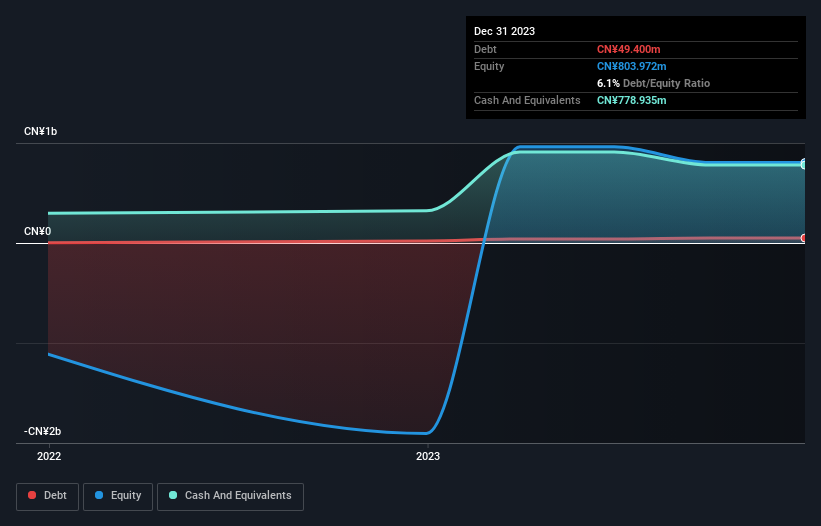
The external fund manager backed by Berkshire Hathaway's Charlie Munger, Li Lu, makes no bones about it when he says 'The biggest investment risk is not the volatility of prices, but whether you will suffer a permanent loss of capital.' So it might be obvious that you need to consider debt, when you think about how risky any given stock is, because too much debt can sink a company. As with many other companies Laekna, Inc. (HKG:2105) makes use of debt. But is this debt a concern to shareholders?
Why Does Debt Bring Risk?
Debt assists a business until the business has trouble paying it off, either with new capital or with free cash flow. If things get really bad, the lenders can take control of the business. While that is not too common, we often do see indebted companies permanently diluting shareholders because lenders force them to raise capital at a distressed price. Having said that, the most common situation is where a company manages its debt reasonably well - and to its own advantage. When we think about a company's use of debt, we first look at cash and debt together.
View our latest analysis for Laekna
How Much Debt Does Laekna Carry?
You can click the graphic below for the historical numbers, but it shows that as of December 2023 Laekna had CN¥49.4m of debt, an increase on CN¥19.8m, over one year. But it also has CN¥778.9m in cash to offset that, meaning it has CN¥729.5m net cash.

How Strong Is Laekna's Balance Sheet?
Zooming in on the latest balance sheet data, we can see that Laekna had liabilities of CN¥119.8m due within 12 months and liabilities of CN¥8.57m due beyond that. On the other hand, it had cash of CN¥778.9m and CN¥1.10m worth of receivables due within a year. So it can boast CN¥651.7m more liquid assets than total liabilities.
This excess liquidity suggests that Laekna is taking a careful approach to debt. Because it has plenty of assets, it is unlikely to have trouble with its lenders. Simply put, the fact that Laekna has more cash than debt is arguably a good indication that it can manage its debt safely. The balance sheet is clearly the area to focus on when you are analysing debt. But it is Laekna's earnings that will influence how the balance sheet holds up in the future. So if you're keen to discover more about its earnings, it might be worth checking out this graph of its long term earnings trend.
Since Laekna doesn't have significant operating revenue, shareholders may be hoping it comes up with a great new product, before it runs out of money.
So How Risky Is Laekna?
Statistically speaking companies that lose money are riskier than those that make money. And the fact is that over the last twelve months Laekna lost money at the earnings before interest and tax (EBIT) line. And over the same period it saw negative free cash outflow of CN¥297m and booked a CN¥369m accounting loss. While this does make the company a bit risky, it's important to remember it has net cash of CN¥729.5m. That kitty means the company can keep spending for growth for at least two years, at current rates. Overall, its balance sheet doesn't seem overly risky, at the moment, but we're always cautious until we see the positive free cash flow. When analysing debt levels, the balance sheet is the obvious place to start. However, not all investment risk resides within the balance sheet - far from it. For example, we've discovered 2 warning signs for Laekna that you should be aware of before investing here.
At the end of the day, it's often better to focus on companies that are free from net debt. You can access our special list of such companies (all with a track record of profit growth). It's free.
New: AI Stock Screener & Alerts
Our new AI Stock Screener scans the market every day to uncover opportunities.
• Dividend Powerhouses (3%+ Yield)
• Undervalued Small Caps with Insider Buying
• High growth Tech and AI Companies
Or build your own from over 50 metrics.
Have feedback on this article? Concerned about the content? Get in touch with us directly. Alternatively, email editorial-team (at) simplywallst.com.
This article by Simply Wall St is general in nature. We provide commentary based on historical data and analyst forecasts only using an unbiased methodology and our articles are not intended to be financial advice. It does not constitute a recommendation to buy or sell any stock, and does not take account of your objectives, or your financial situation. We aim to bring you long-term focused analysis driven by fundamental data. Note that our analysis may not factor in the latest price-sensitive company announcements or qualitative material. Simply Wall St has no position in any stocks mentioned.
About SEHK:2105
Laekna
An investing holding company, engages in the discovering, development, and commercialization of therapies for patients with cancer, metabolic diseases, and liver fibrosis worldwide.
Excellent balance sheet very low.
Market Insights
Community Narratives



